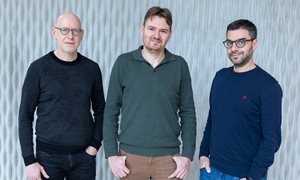
Clyde Francks has been appointed Professor by special appointment of Brain Imaging Genomics at Radboud university medical center / Radboud University. He studies the genetics of language, brain disorders and asymmetry of the brain on its left to right axis. His aim is a better understanding of brain asymmetry in health and disease at multiple levels – from molecules and cells to brain networks and anatomy.
Clyde Francks leads the Imaging Genomics research group at the Max Planck Institute in Nijmegen. Francks’ aim is to find out more about the brain’s asymmetry – the way that the left and right sides are specialized for different functions – and how changes in brain asymmetry are related to brain disorders like schizophrenia and autism. Francks: ‘Asymmetry plays an important role in the way that the human brain is organised. For instance, in the majority of people, the left hemisphere is dominant for language and controls the right hand, but this is less often the case in people with autism or schizophrenia. In a large study of over 30.000 brain images and genetic data, we found various DNA variants that were associated with brain asymmetry. Some of these DNA variants were also associated with schizophrenia and autism. We want to know more about the genes involved.’
Research at Oxford into dyslexia
Clyde Francks (1975, Leicester, United Kingdom) graduated in zoology from the University of Oxford in 1996. He then moved to the Wellcome Trust Centre for Human Genetics, Oxford, where he obtained his doctorate (Wellcome Trust Prize student, DPhil 2002) and stayed as a postdoctoral researcher until 2005. During these years he investigated the genetics of dyslexia (title doctoral thesis: “Mapping of genes causing dyslexia susceptibility”) and led a project on the genetics of left and right handedness and schizophrenia. ‘I was interested in the wide open questions: “how does the brain become asymmetric, and how’s that related to brain disorders?”, says Francks. ‘There’s still so much to find out in this field of research.’
From 2005 he continued as a visiting fellow at Oxford while working as a manager in the pharmaceuticals industry (GlaxoSmithKline, Verona, Italy), during which time he led collaborative academia-industry projects on the genetics of schizophrenia and cigarette smoking. In 2010 he started in his current position at the Max Planck Institute, Nijmegen. With his new affiliation, a closer collaboration between Radboud university medical center and the Max Planck Institute will be established.
Imaging Genomics Research Group
For most people, the left and right sides of the brain specialize in performing different functions and processing different types of information - in fact, much of our cognition is somewhat lateralized to one side or the other. Francks’ research group is particularly interested in the genes that are involved in specifying how the two hemispheres of the brain come to function differently, for example by affecting the development of the embryonic brain. He found evidence that some of these same genes are also involved in the risk of developing brain-related disorders such as schizophrenia and autism spectrum disorder, in which the brain's asymmetry can be altered. ‘In the next three years, I hope to take some steps towards understanding how these genes affect brain asymmetry, and what’s the relevance of altered asymmetry for autism and schizophrenia’, says Francks.
More information
Clyde Francks has been appointed as professor by special appointment of Brain Imaging Genomics, appointment April 1, 2022, for 3 years. Find out more about Max Planck Institute in Nijmegen here. The research group of Clyde Francks is funded by the Max Planck Society with additional grant funding from the Dutch Research Council (NWO).
-
Want to know more about these subjects? Click on the buttons below for more news.
More information
Pauline Dekhuijzen

wetenschaps- en persvoorlichter






